Research Methods: WSN Authentication and Security Maintenance
VerifiedAdded on 2021/04/17
|26
|6517
|161
Report
AI Summary
This report, focusing on 'Analyzing the authentication and security maintenance in Wireless Sensor Network (WSN)', delves into the critical aspects of WSN security. The study explores the security issues inherent in WSNs, including false data attacks and vulnerabilities in authentication processes. It investigates methods to maintain security, such as cryptographic algorithms, biometric authentication, and shared key techniques, while also acknowledging the limitations of these approaches, including energy consumption and memory constraints. The report examines the relevance of the research topic, the challenges in security, and the significance of authentication protocols. The report covers the importance of data confidentiality, authentication, and integrity, and highlights the need for robust solutions to understand threat models and secure the wireless network. The research methodology includes a literature review, research questions, and a project proposal, covering research philosophy, approach, design, data sources, analysis techniques, and evaluation methodology. It concludes that effective techniques are crucial to reduce false data attacks and improve authentication schemes, increasing the privacy of user data.
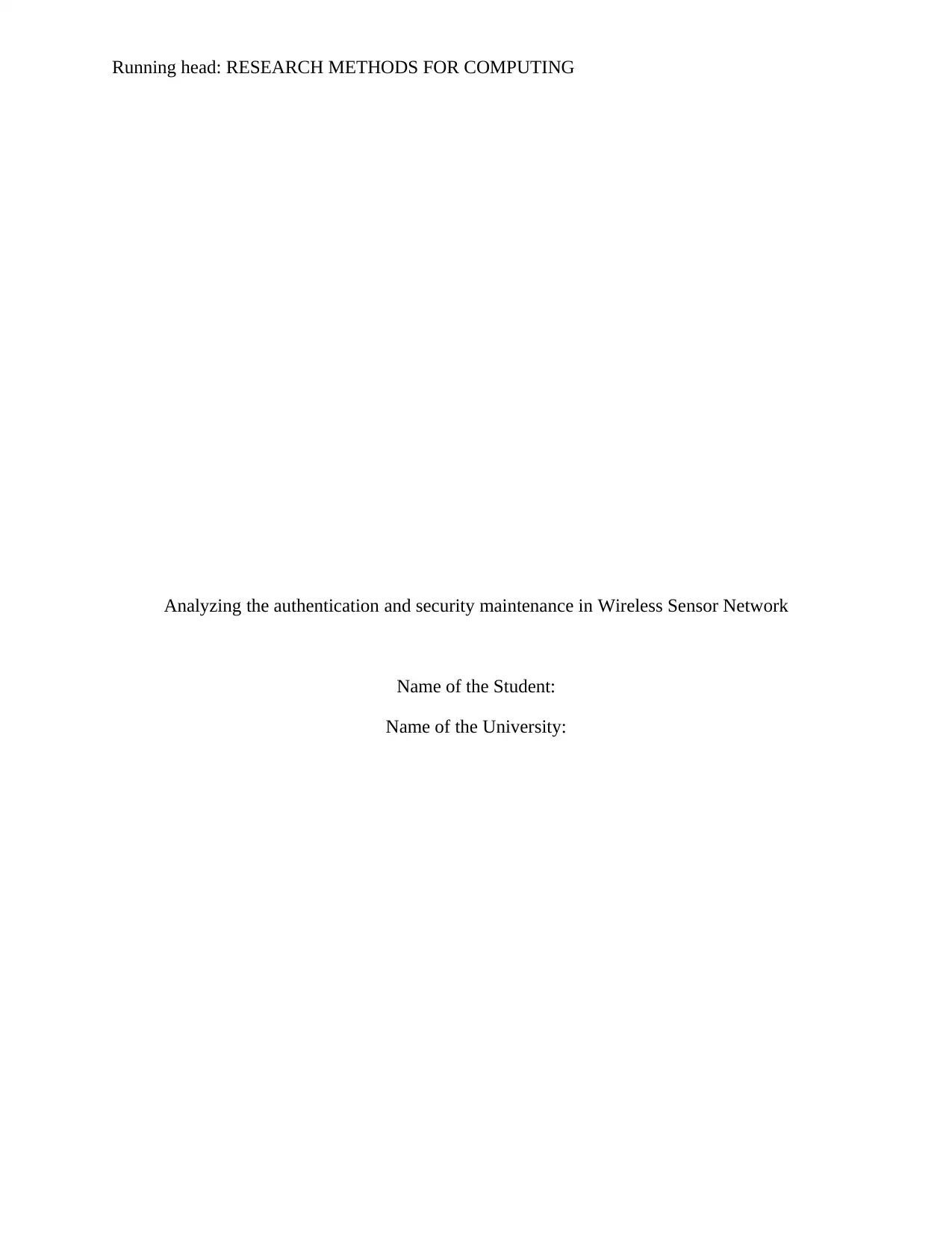
Running head: RESEARCH METHODS FOR COMPUTING
Analyzing the authentication and security maintenance in Wireless Sensor Network
Name of the Student:
Name of the University:
Analyzing the authentication and security maintenance in Wireless Sensor Network
Name of the Student:
Name of the University:
Paraphrase This Document
Need a fresh take? Get an instant paraphrase of this document with our AI Paraphraser
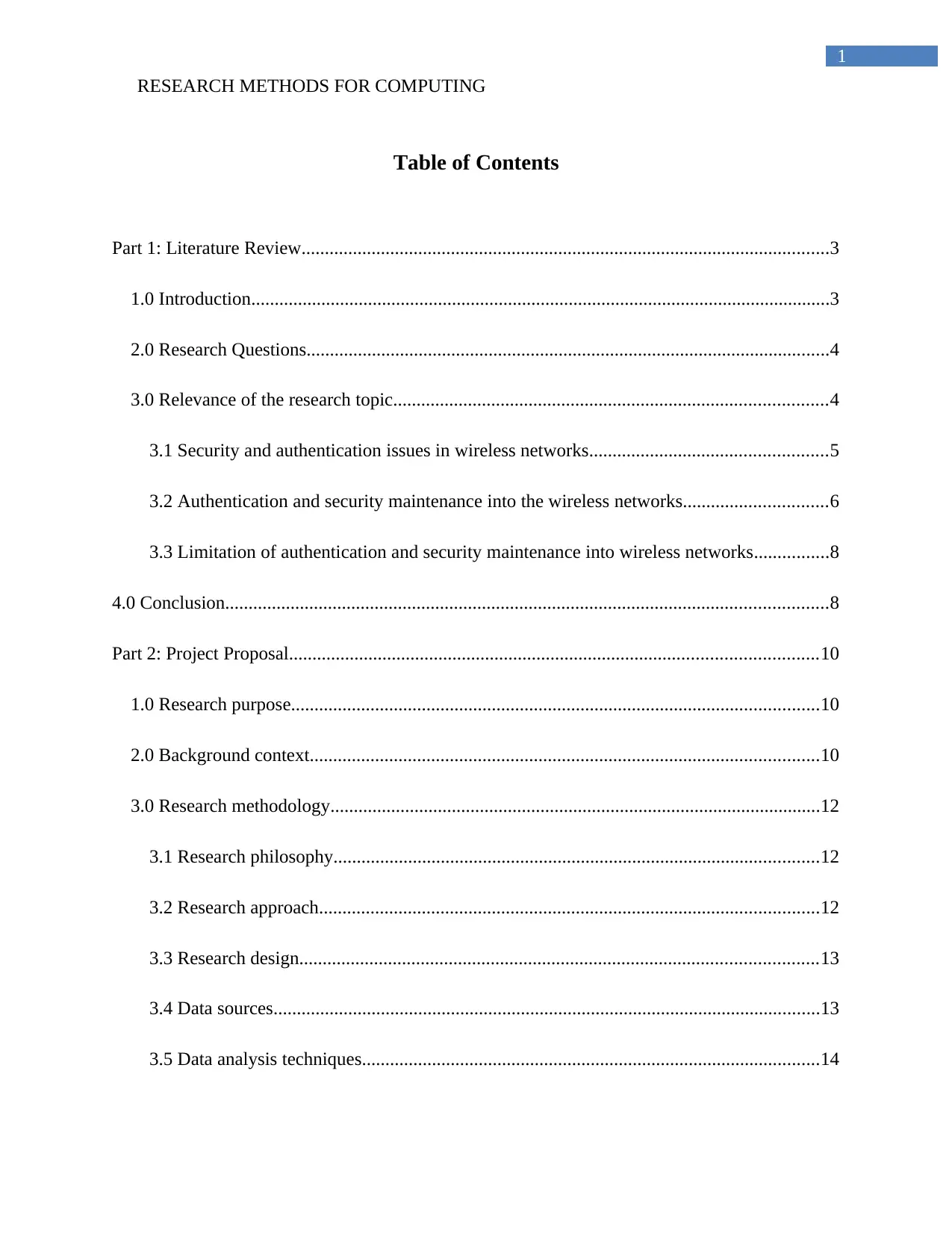
1
RESEARCH METHODS FOR COMPUTING
Table of Contents
Part 1: Literature Review.................................................................................................................3
1.0 Introduction............................................................................................................................3
2.0 Research Questions................................................................................................................4
3.0 Relevance of the research topic.............................................................................................4
3.1 Security and authentication issues in wireless networks...................................................5
3.2 Authentication and security maintenance into the wireless networks...............................6
3.3 Limitation of authentication and security maintenance into wireless networks................8
4.0 Conclusion.................................................................................................................................8
Part 2: Project Proposal.................................................................................................................10
1.0 Research purpose.................................................................................................................10
2.0 Background context.............................................................................................................10
3.0 Research methodology.........................................................................................................12
3.1 Research philosophy........................................................................................................12
3.2 Research approach...........................................................................................................12
3.3 Research design...............................................................................................................13
3.4 Data sources.....................................................................................................................13
3.5 Data analysis techniques..................................................................................................14
RESEARCH METHODS FOR COMPUTING
Table of Contents
Part 1: Literature Review.................................................................................................................3
1.0 Introduction............................................................................................................................3
2.0 Research Questions................................................................................................................4
3.0 Relevance of the research topic.............................................................................................4
3.1 Security and authentication issues in wireless networks...................................................5
3.2 Authentication and security maintenance into the wireless networks...............................6
3.3 Limitation of authentication and security maintenance into wireless networks................8
4.0 Conclusion.................................................................................................................................8
Part 2: Project Proposal.................................................................................................................10
1.0 Research purpose.................................................................................................................10
2.0 Background context.............................................................................................................10
3.0 Research methodology.........................................................................................................12
3.1 Research philosophy........................................................................................................12
3.2 Research approach...........................................................................................................12
3.3 Research design...............................................................................................................13
3.4 Data sources.....................................................................................................................13
3.5 Data analysis techniques..................................................................................................14

2
RESEARCH METHODS FOR COMPUTING
4.0 Evaluation methodology......................................................................................................14
5.0 Schedule and publishing......................................................................................................16
6.0 Professional, legal and ethical issues...................................................................................19
References......................................................................................................................................21
RESEARCH METHODS FOR COMPUTING
4.0 Evaluation methodology......................................................................................................14
5.0 Schedule and publishing......................................................................................................16
6.0 Professional, legal and ethical issues...................................................................................19
References......................................................................................................................................21
⊘ This is a preview!⊘
Do you want full access?
Subscribe today to unlock all pages.

Trusted by 1+ million students worldwide
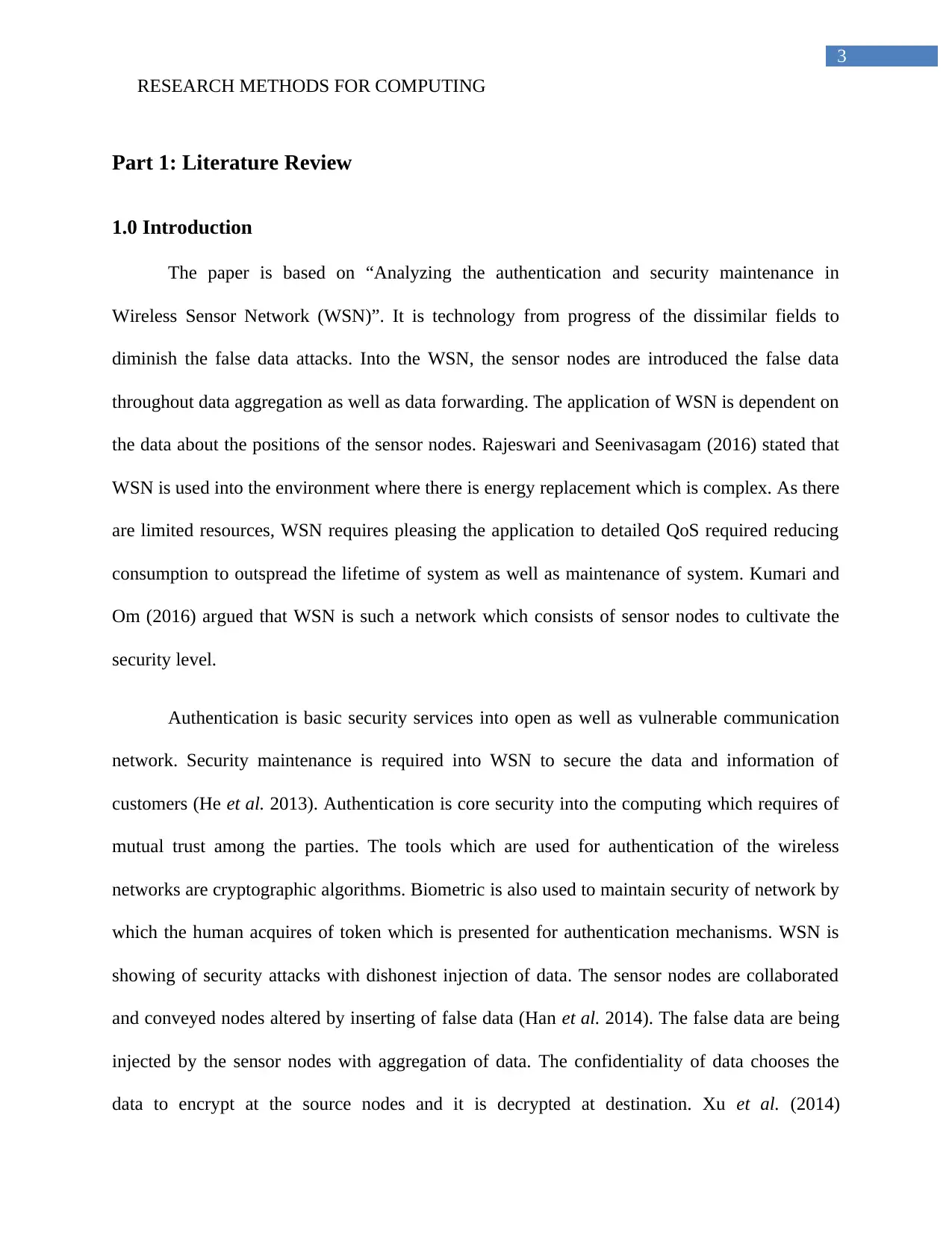
3
RESEARCH METHODS FOR COMPUTING
Part 1: Literature Review
1.0 Introduction
The paper is based on “Analyzing the authentication and security maintenance in
Wireless Sensor Network (WSN)”. It is technology from progress of the dissimilar fields to
diminish the false data attacks. Into the WSN, the sensor nodes are introduced the false data
throughout data aggregation as well as data forwarding. The application of WSN is dependent on
the data about the positions of the sensor nodes. Rajeswari and Seenivasagam (2016) stated that
WSN is used into the environment where there is energy replacement which is complex. As there
are limited resources, WSN requires pleasing the application to detailed QoS required reducing
consumption to outspread the lifetime of system as well as maintenance of system. Kumari and
Om (2016) argued that WSN is such a network which consists of sensor nodes to cultivate the
security level.
Authentication is basic security services into open as well as vulnerable communication
network. Security maintenance is required into WSN to secure the data and information of
customers (He et al. 2013). Authentication is core security into the computing which requires of
mutual trust among the parties. The tools which are used for authentication of the wireless
networks are cryptographic algorithms. Biometric is also used to maintain security of network by
which the human acquires of token which is presented for authentication mechanisms. WSN is
showing of security attacks with dishonest injection of data. The sensor nodes are collaborated
and conveyed nodes altered by inserting of false data (Han et al. 2014). The false data are being
injected by the sensor nodes with aggregation of data. The confidentiality of data chooses the
data to encrypt at the source nodes and it is decrypted at destination. Xu et al. (2014)
RESEARCH METHODS FOR COMPUTING
Part 1: Literature Review
1.0 Introduction
The paper is based on “Analyzing the authentication and security maintenance in
Wireless Sensor Network (WSN)”. It is technology from progress of the dissimilar fields to
diminish the false data attacks. Into the WSN, the sensor nodes are introduced the false data
throughout data aggregation as well as data forwarding. The application of WSN is dependent on
the data about the positions of the sensor nodes. Rajeswari and Seenivasagam (2016) stated that
WSN is used into the environment where there is energy replacement which is complex. As there
are limited resources, WSN requires pleasing the application to detailed QoS required reducing
consumption to outspread the lifetime of system as well as maintenance of system. Kumari and
Om (2016) argued that WSN is such a network which consists of sensor nodes to cultivate the
security level.
Authentication is basic security services into open as well as vulnerable communication
network. Security maintenance is required into WSN to secure the data and information of
customers (He et al. 2013). Authentication is core security into the computing which requires of
mutual trust among the parties. The tools which are used for authentication of the wireless
networks are cryptographic algorithms. Biometric is also used to maintain security of network by
which the human acquires of token which is presented for authentication mechanisms. WSN is
showing of security attacks with dishonest injection of data. The sensor nodes are collaborated
and conveyed nodes altered by inserting of false data (Han et al. 2014). The false data are being
injected by the sensor nodes with aggregation of data. The confidentiality of data chooses the
data to encrypt at the source nodes and it is decrypted at destination. Xu et al. (2014)
Paraphrase This Document
Need a fresh take? Get an instant paraphrase of this document with our AI Paraphraser
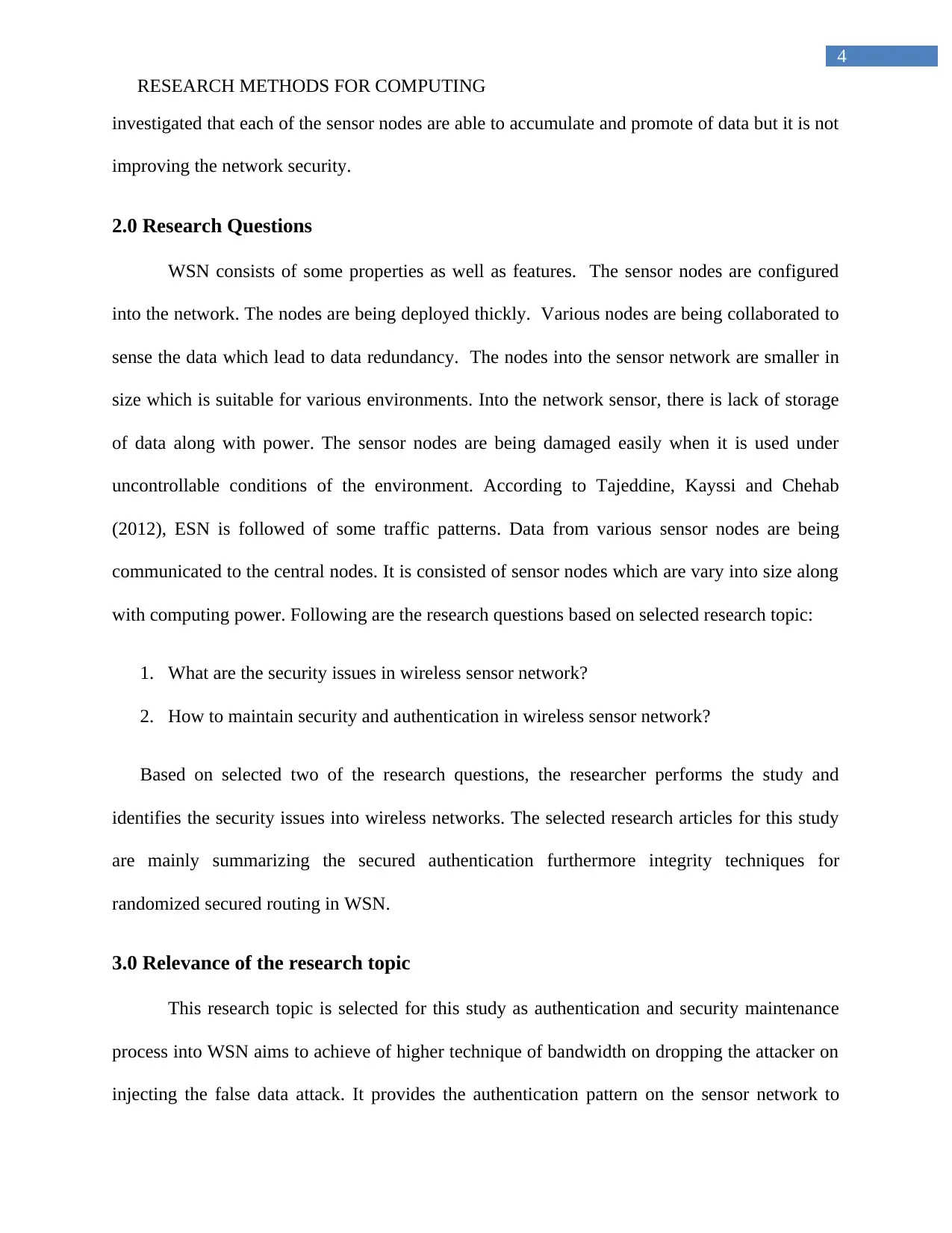
4
RESEARCH METHODS FOR COMPUTING
investigated that each of the sensor nodes are able to accumulate and promote of data but it is not
improving the network security.
2.0 Research Questions
WSN consists of some properties as well as features. The sensor nodes are configured
into the network. The nodes are being deployed thickly. Various nodes are being collaborated to
sense the data which lead to data redundancy. The nodes into the sensor network are smaller in
size which is suitable for various environments. Into the network sensor, there is lack of storage
of data along with power. The sensor nodes are being damaged easily when it is used under
uncontrollable conditions of the environment. According to Tajeddine, Kayssi and Chehab
(2012), ESN is followed of some traffic patterns. Data from various sensor nodes are being
communicated to the central nodes. It is consisted of sensor nodes which are vary into size along
with computing power. Following are the research questions based on selected research topic:
1. What are the security issues in wireless sensor network?
2. How to maintain security and authentication in wireless sensor network?
Based on selected two of the research questions, the researcher performs the study and
identifies the security issues into wireless networks. The selected research articles for this study
are mainly summarizing the secured authentication furthermore integrity techniques for
randomized secured routing in WSN.
3.0 Relevance of the research topic
This research topic is selected for this study as authentication and security maintenance
process into WSN aims to achieve of higher technique of bandwidth on dropping the attacker on
injecting the false data attack. It provides the authentication pattern on the sensor network to
RESEARCH METHODS FOR COMPUTING
investigated that each of the sensor nodes are able to accumulate and promote of data but it is not
improving the network security.
2.0 Research Questions
WSN consists of some properties as well as features. The sensor nodes are configured
into the network. The nodes are being deployed thickly. Various nodes are being collaborated to
sense the data which lead to data redundancy. The nodes into the sensor network are smaller in
size which is suitable for various environments. Into the network sensor, there is lack of storage
of data along with power. The sensor nodes are being damaged easily when it is used under
uncontrollable conditions of the environment. According to Tajeddine, Kayssi and Chehab
(2012), ESN is followed of some traffic patterns. Data from various sensor nodes are being
communicated to the central nodes. It is consisted of sensor nodes which are vary into size along
with computing power. Following are the research questions based on selected research topic:
1. What are the security issues in wireless sensor network?
2. How to maintain security and authentication in wireless sensor network?
Based on selected two of the research questions, the researcher performs the study and
identifies the security issues into wireless networks. The selected research articles for this study
are mainly summarizing the secured authentication furthermore integrity techniques for
randomized secured routing in WSN.
3.0 Relevance of the research topic
This research topic is selected for this study as authentication and security maintenance
process into WSN aims to achieve of higher technique of bandwidth on dropping the attacker on
injecting the false data attack. It provides the authentication pattern on the sensor network to
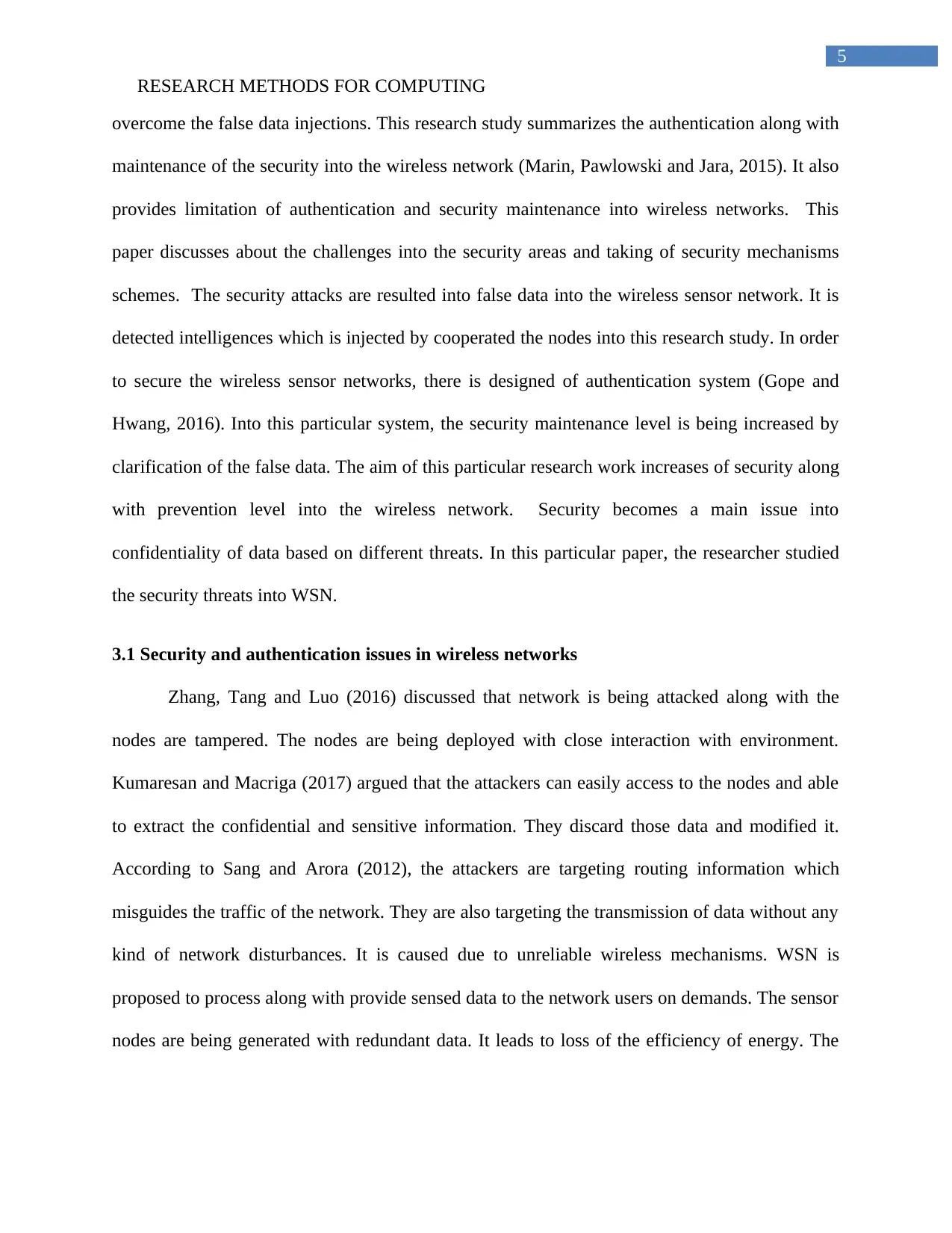
5
RESEARCH METHODS FOR COMPUTING
overcome the false data injections. This research study summarizes the authentication along with
maintenance of the security into the wireless network (Marin, Pawlowski and Jara, 2015). It also
provides limitation of authentication and security maintenance into wireless networks. This
paper discusses about the challenges into the security areas and taking of security mechanisms
schemes. The security attacks are resulted into false data into the wireless sensor network. It is
detected intelligences which is injected by cooperated the nodes into this research study. In order
to secure the wireless sensor networks, there is designed of authentication system (Gope and
Hwang, 2016). Into this particular system, the security maintenance level is being increased by
clarification of the false data. The aim of this particular research work increases of security along
with prevention level into the wireless network. Security becomes a main issue into
confidentiality of data based on different threats. In this particular paper, the researcher studied
the security threats into WSN.
3.1 Security and authentication issues in wireless networks
Zhang, Tang and Luo (2016) discussed that network is being attacked along with the
nodes are tampered. The nodes are being deployed with close interaction with environment.
Kumaresan and Macriga (2017) argued that the attackers can easily access to the nodes and able
to extract the confidential and sensitive information. They discard those data and modified it.
According to Sang and Arora (2012), the attackers are targeting routing information which
misguides the traffic of the network. They are also targeting the transmission of data without any
kind of network disturbances. It is caused due to unreliable wireless mechanisms. WSN is
proposed to process along with provide sensed data to the network users on demands. The sensor
nodes are being generated with redundant data. It leads to loss of the efficiency of energy. The
RESEARCH METHODS FOR COMPUTING
overcome the false data injections. This research study summarizes the authentication along with
maintenance of the security into the wireless network (Marin, Pawlowski and Jara, 2015). It also
provides limitation of authentication and security maintenance into wireless networks. This
paper discusses about the challenges into the security areas and taking of security mechanisms
schemes. The security attacks are resulted into false data into the wireless sensor network. It is
detected intelligences which is injected by cooperated the nodes into this research study. In order
to secure the wireless sensor networks, there is designed of authentication system (Gope and
Hwang, 2016). Into this particular system, the security maintenance level is being increased by
clarification of the false data. The aim of this particular research work increases of security along
with prevention level into the wireless network. Security becomes a main issue into
confidentiality of data based on different threats. In this particular paper, the researcher studied
the security threats into WSN.
3.1 Security and authentication issues in wireless networks
Zhang, Tang and Luo (2016) discussed that network is being attacked along with the
nodes are tampered. The nodes are being deployed with close interaction with environment.
Kumaresan and Macriga (2017) argued that the attackers can easily access to the nodes and able
to extract the confidential and sensitive information. They discard those data and modified it.
According to Sang and Arora (2012), the attackers are targeting routing information which
misguides the traffic of the network. They are also targeting the transmission of data without any
kind of network disturbances. It is caused due to unreliable wireless mechanisms. WSN is
proposed to process along with provide sensed data to the network users on demands. The sensor
nodes are being generated with redundant data. It leads to loss of the efficiency of energy. The
⊘ This is a preview!⊘
Do you want full access?
Subscribe today to unlock all pages.

Trusted by 1+ million students worldwide
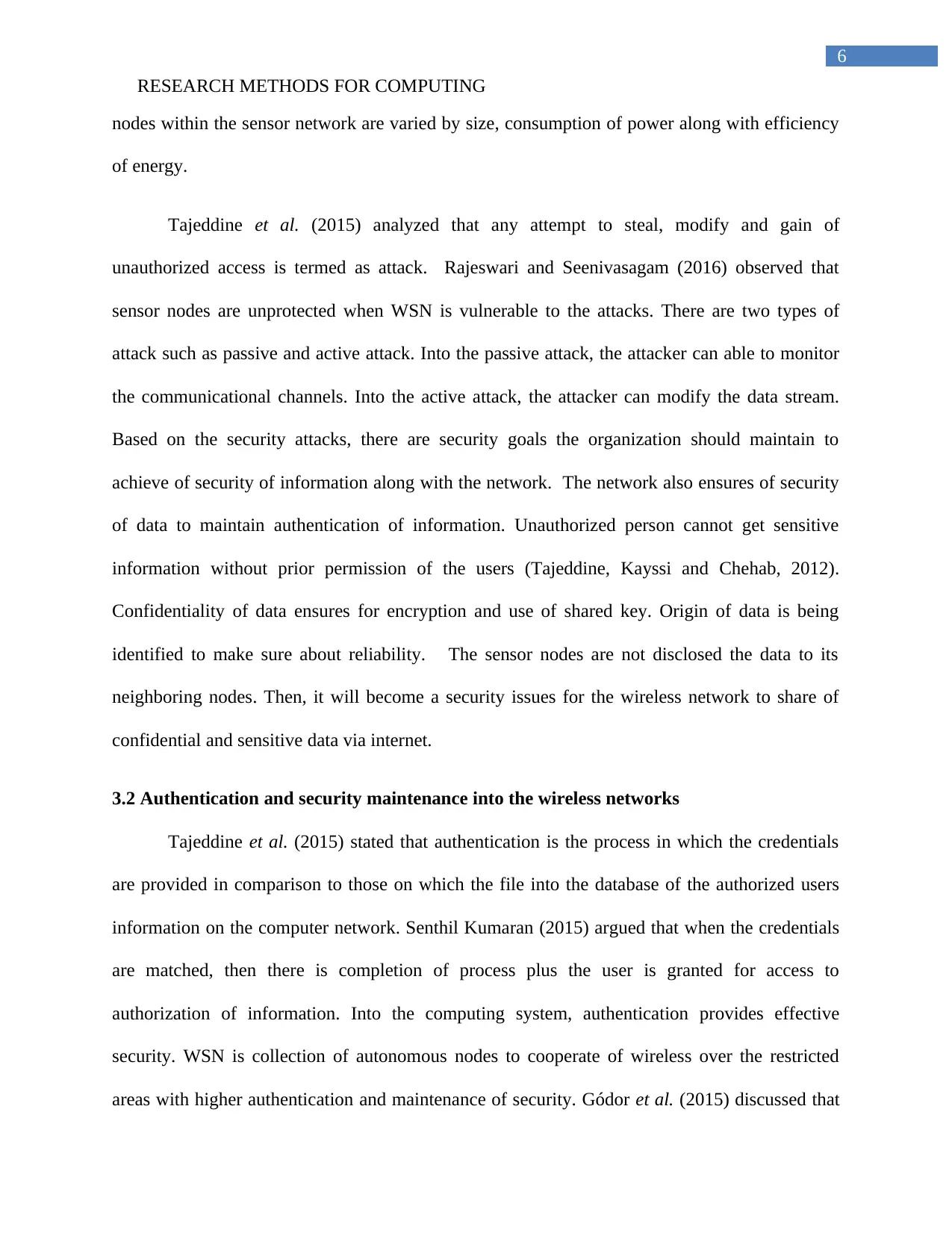
6
RESEARCH METHODS FOR COMPUTING
nodes within the sensor network are varied by size, consumption of power along with efficiency
of energy.
Tajeddine et al. (2015) analyzed that any attempt to steal, modify and gain of
unauthorized access is termed as attack. Rajeswari and Seenivasagam (2016) observed that
sensor nodes are unprotected when WSN is vulnerable to the attacks. There are two types of
attack such as passive and active attack. Into the passive attack, the attacker can able to monitor
the communicational channels. Into the active attack, the attacker can modify the data stream.
Based on the security attacks, there are security goals the organization should maintain to
achieve of security of information along with the network. The network also ensures of security
of data to maintain authentication of information. Unauthorized person cannot get sensitive
information without prior permission of the users (Tajeddine, Kayssi and Chehab, 2012).
Confidentiality of data ensures for encryption and use of shared key. Origin of data is being
identified to make sure about reliability. The sensor nodes are not disclosed the data to its
neighboring nodes. Then, it will become a security issues for the wireless network to share of
confidential and sensitive data via internet.
3.2 Authentication and security maintenance into the wireless networks
Tajeddine et al. (2015) stated that authentication is the process in which the credentials
are provided in comparison to those on which the file into the database of the authorized users
information on the computer network. Senthil Kumaran (2015) argued that when the credentials
are matched, then there is completion of process plus the user is granted for access to
authorization of information. Into the computing system, authentication provides effective
security. WSN is collection of autonomous nodes to cooperate of wireless over the restricted
areas with higher authentication and maintenance of security. Gódor et al. (2015) discussed that
RESEARCH METHODS FOR COMPUTING
nodes within the sensor network are varied by size, consumption of power along with efficiency
of energy.
Tajeddine et al. (2015) analyzed that any attempt to steal, modify and gain of
unauthorized access is termed as attack. Rajeswari and Seenivasagam (2016) observed that
sensor nodes are unprotected when WSN is vulnerable to the attacks. There are two types of
attack such as passive and active attack. Into the passive attack, the attacker can able to monitor
the communicational channels. Into the active attack, the attacker can modify the data stream.
Based on the security attacks, there are security goals the organization should maintain to
achieve of security of information along with the network. The network also ensures of security
of data to maintain authentication of information. Unauthorized person cannot get sensitive
information without prior permission of the users (Tajeddine, Kayssi and Chehab, 2012).
Confidentiality of data ensures for encryption and use of shared key. Origin of data is being
identified to make sure about reliability. The sensor nodes are not disclosed the data to its
neighboring nodes. Then, it will become a security issues for the wireless network to share of
confidential and sensitive data via internet.
3.2 Authentication and security maintenance into the wireless networks
Tajeddine et al. (2015) stated that authentication is the process in which the credentials
are provided in comparison to those on which the file into the database of the authorized users
information on the computer network. Senthil Kumaran (2015) argued that when the credentials
are matched, then there is completion of process plus the user is granted for access to
authorization of information. Into the computing system, authentication provides effective
security. WSN is collection of autonomous nodes to cooperate of wireless over the restricted
areas with higher authentication and maintenance of security. Gódor et al. (2015) discussed that
Paraphrase This Document
Need a fresh take? Get an instant paraphrase of this document with our AI Paraphraser
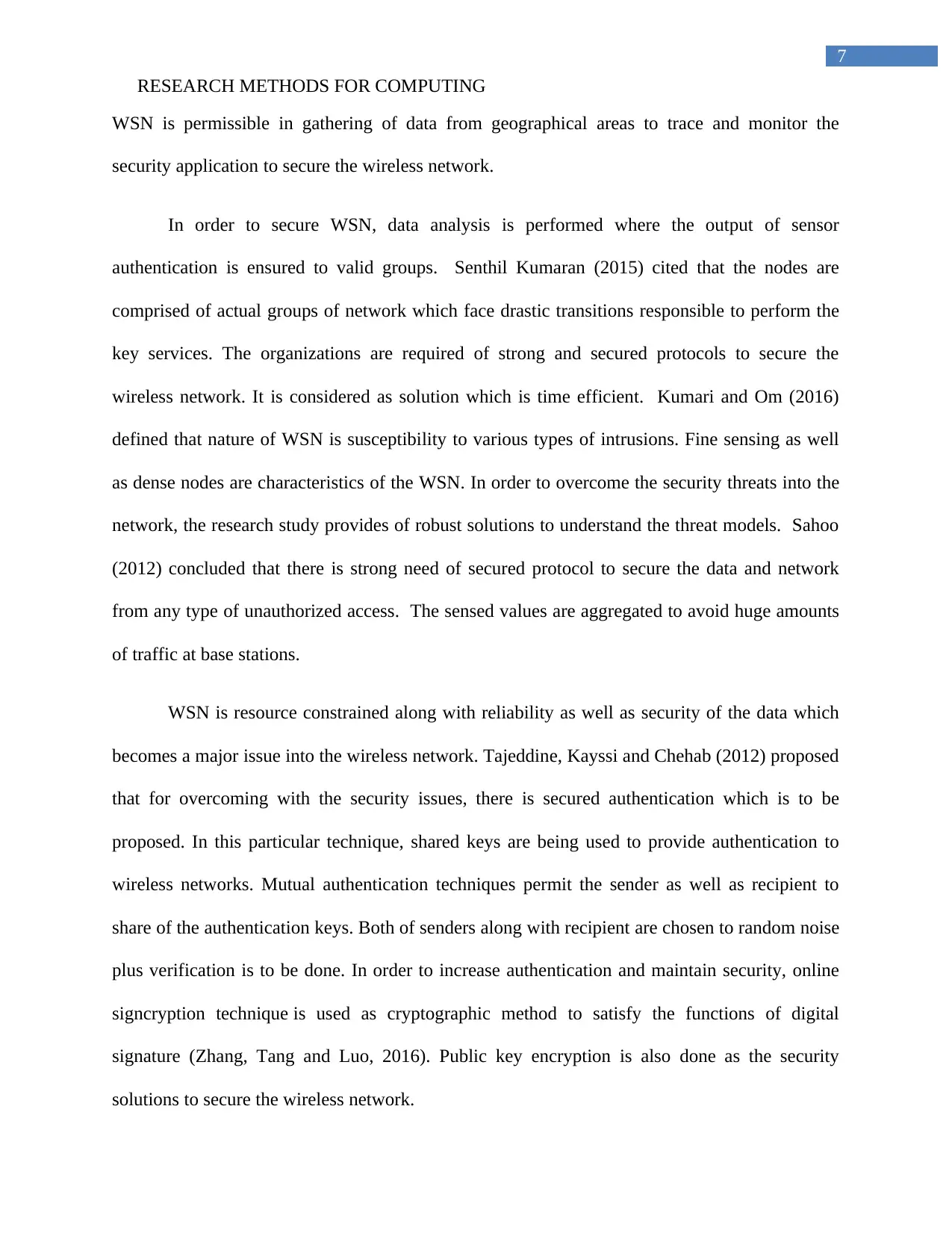
7
RESEARCH METHODS FOR COMPUTING
WSN is permissible in gathering of data from geographical areas to trace and monitor the
security application to secure the wireless network.
In order to secure WSN, data analysis is performed where the output of sensor
authentication is ensured to valid groups. Senthil Kumaran (2015) cited that the nodes are
comprised of actual groups of network which face drastic transitions responsible to perform the
key services. The organizations are required of strong and secured protocols to secure the
wireless network. It is considered as solution which is time efficient. Kumari and Om (2016)
defined that nature of WSN is susceptibility to various types of intrusions. Fine sensing as well
as dense nodes are characteristics of the WSN. In order to overcome the security threats into the
network, the research study provides of robust solutions to understand the threat models. Sahoo
(2012) concluded that there is strong need of secured protocol to secure the data and network
from any type of unauthorized access. The sensed values are aggregated to avoid huge amounts
of traffic at base stations.
WSN is resource constrained along with reliability as well as security of the data which
becomes a major issue into the wireless network. Tajeddine, Kayssi and Chehab (2012) proposed
that for overcoming with the security issues, there is secured authentication which is to be
proposed. In this particular technique, shared keys are being used to provide authentication to
wireless networks. Mutual authentication techniques permit the sender as well as recipient to
share of the authentication keys. Both of senders along with recipient are chosen to random noise
plus verification is to be done. In order to increase authentication and maintain security, online
signcryption technique is used as cryptographic method to satisfy the functions of digital
signature (Zhang, Tang and Luo, 2016). Public key encryption is also done as the security
solutions to secure the wireless network.
RESEARCH METHODS FOR COMPUTING
WSN is permissible in gathering of data from geographical areas to trace and monitor the
security application to secure the wireless network.
In order to secure WSN, data analysis is performed where the output of sensor
authentication is ensured to valid groups. Senthil Kumaran (2015) cited that the nodes are
comprised of actual groups of network which face drastic transitions responsible to perform the
key services. The organizations are required of strong and secured protocols to secure the
wireless network. It is considered as solution which is time efficient. Kumari and Om (2016)
defined that nature of WSN is susceptibility to various types of intrusions. Fine sensing as well
as dense nodes are characteristics of the WSN. In order to overcome the security threats into the
network, the research study provides of robust solutions to understand the threat models. Sahoo
(2012) concluded that there is strong need of secured protocol to secure the data and network
from any type of unauthorized access. The sensed values are aggregated to avoid huge amounts
of traffic at base stations.
WSN is resource constrained along with reliability as well as security of the data which
becomes a major issue into the wireless network. Tajeddine, Kayssi and Chehab (2012) proposed
that for overcoming with the security issues, there is secured authentication which is to be
proposed. In this particular technique, shared keys are being used to provide authentication to
wireless networks. Mutual authentication techniques permit the sender as well as recipient to
share of the authentication keys. Both of senders along with recipient are chosen to random noise
plus verification is to be done. In order to increase authentication and maintain security, online
signcryption technique is used as cryptographic method to satisfy the functions of digital
signature (Zhang, Tang and Luo, 2016). Public key encryption is also done as the security
solutions to secure the wireless network.
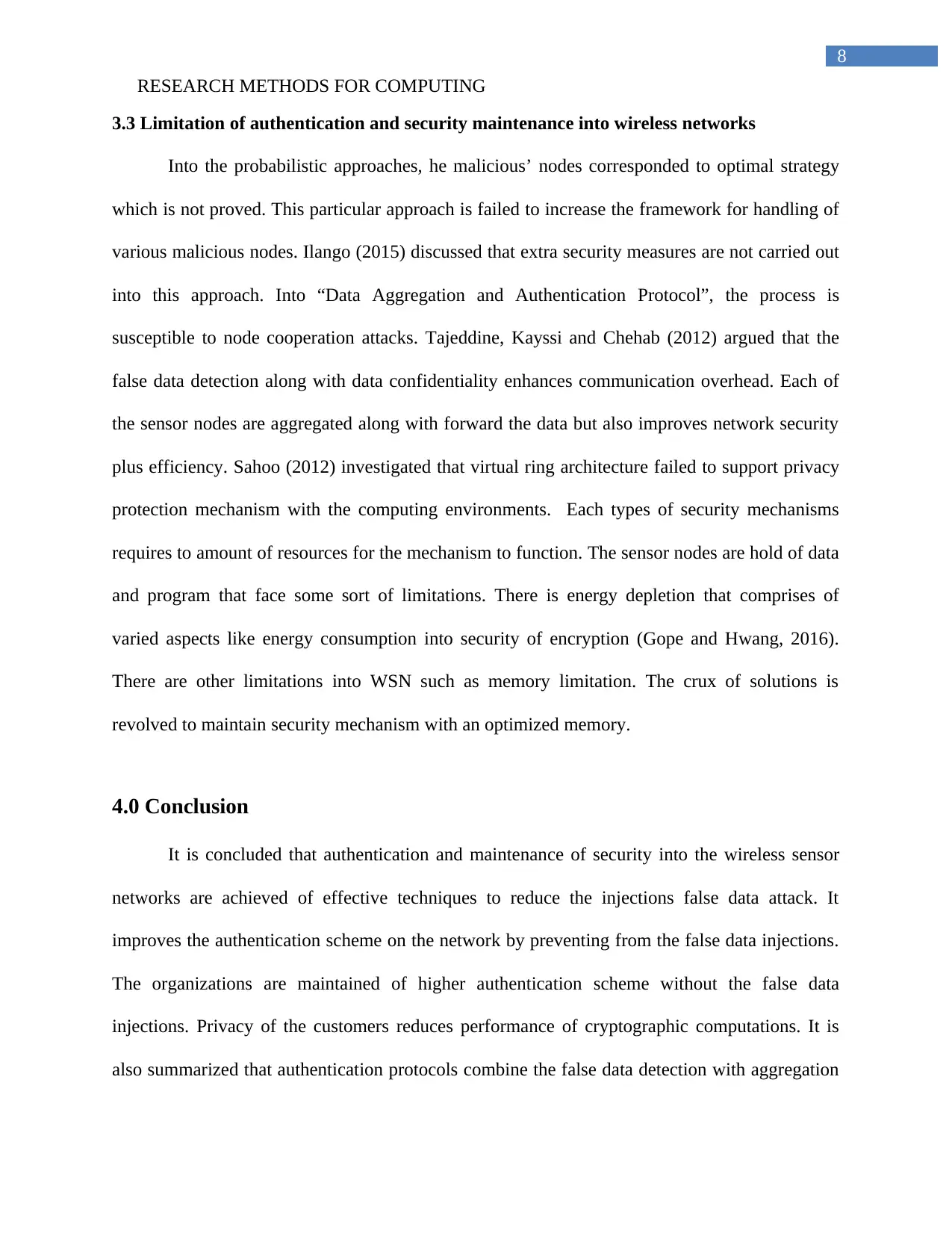
8
RESEARCH METHODS FOR COMPUTING
3.3 Limitation of authentication and security maintenance into wireless networks
Into the probabilistic approaches, he malicious’ nodes corresponded to optimal strategy
which is not proved. This particular approach is failed to increase the framework for handling of
various malicious nodes. Ilango (2015) discussed that extra security measures are not carried out
into this approach. Into “Data Aggregation and Authentication Protocol”, the process is
susceptible to node cooperation attacks. Tajeddine, Kayssi and Chehab (2012) argued that the
false data detection along with data confidentiality enhances communication overhead. Each of
the sensor nodes are aggregated along with forward the data but also improves network security
plus efficiency. Sahoo (2012) investigated that virtual ring architecture failed to support privacy
protection mechanism with the computing environments. Each types of security mechanisms
requires to amount of resources for the mechanism to function. The sensor nodes are hold of data
and program that face some sort of limitations. There is energy depletion that comprises of
varied aspects like energy consumption into security of encryption (Gope and Hwang, 2016).
There are other limitations into WSN such as memory limitation. The crux of solutions is
revolved to maintain security mechanism with an optimized memory.
4.0 Conclusion
It is concluded that authentication and maintenance of security into the wireless sensor
networks are achieved of effective techniques to reduce the injections false data attack. It
improves the authentication scheme on the network by preventing from the false data injections.
The organizations are maintained of higher authentication scheme without the false data
injections. Privacy of the customers reduces performance of cryptographic computations. It is
also summarized that authentication protocols combine the false data detection with aggregation
RESEARCH METHODS FOR COMPUTING
3.3 Limitation of authentication and security maintenance into wireless networks
Into the probabilistic approaches, he malicious’ nodes corresponded to optimal strategy
which is not proved. This particular approach is failed to increase the framework for handling of
various malicious nodes. Ilango (2015) discussed that extra security measures are not carried out
into this approach. Into “Data Aggregation and Authentication Protocol”, the process is
susceptible to node cooperation attacks. Tajeddine, Kayssi and Chehab (2012) argued that the
false data detection along with data confidentiality enhances communication overhead. Each of
the sensor nodes are aggregated along with forward the data but also improves network security
plus efficiency. Sahoo (2012) investigated that virtual ring architecture failed to support privacy
protection mechanism with the computing environments. Each types of security mechanisms
requires to amount of resources for the mechanism to function. The sensor nodes are hold of data
and program that face some sort of limitations. There is energy depletion that comprises of
varied aspects like energy consumption into security of encryption (Gope and Hwang, 2016).
There are other limitations into WSN such as memory limitation. The crux of solutions is
revolved to maintain security mechanism with an optimized memory.
4.0 Conclusion
It is concluded that authentication and maintenance of security into the wireless sensor
networks are achieved of effective techniques to reduce the injections false data attack. It
improves the authentication scheme on the network by preventing from the false data injections.
The organizations are maintained of higher authentication scheme without the false data
injections. Privacy of the customers reduces performance of cryptographic computations. It is
also summarized that authentication protocols combine the false data detection with aggregation
⊘ This is a preview!⊘
Do you want full access?
Subscribe today to unlock all pages.

Trusted by 1+ million students worldwide
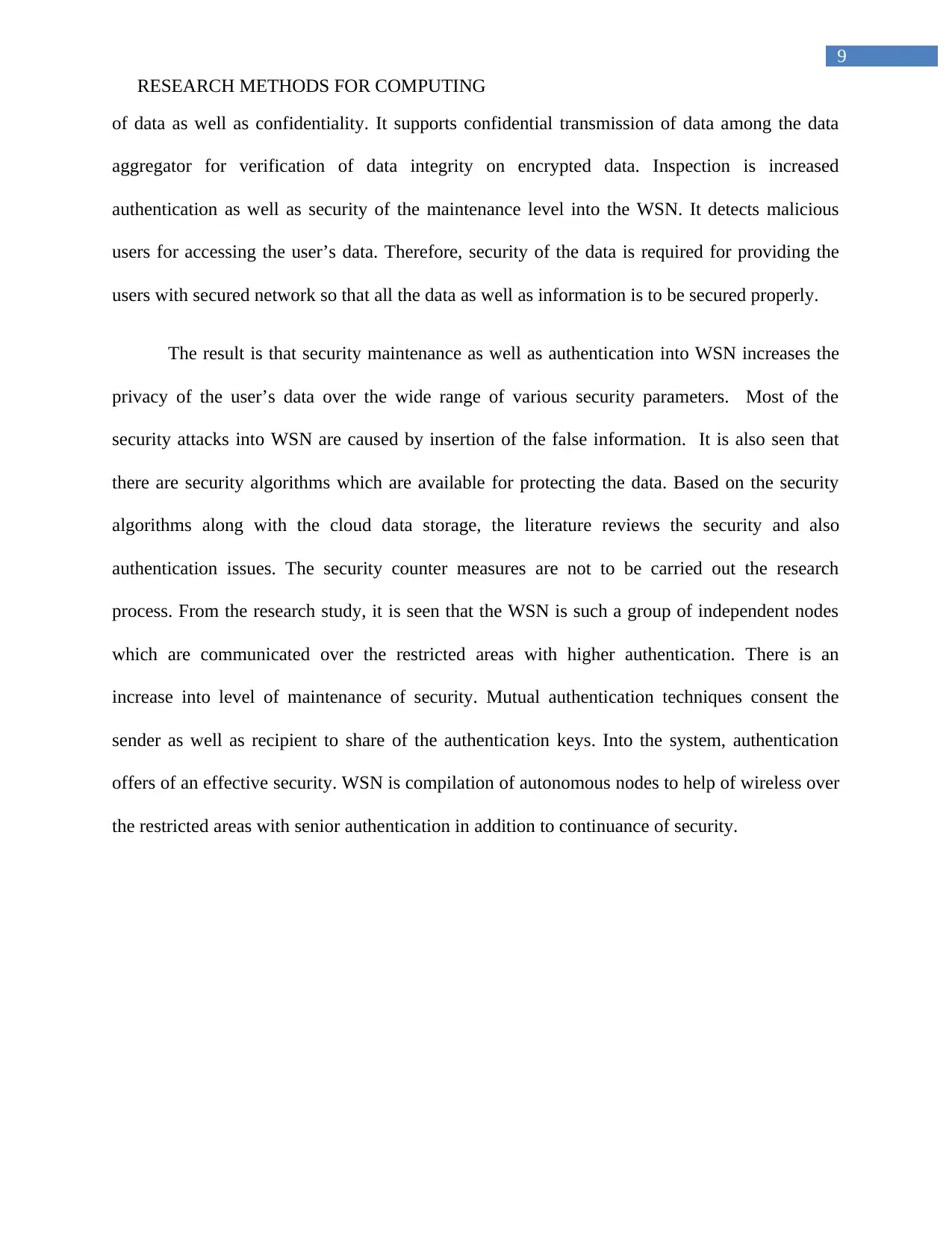
9
RESEARCH METHODS FOR COMPUTING
of data as well as confidentiality. It supports confidential transmission of data among the data
aggregator for verification of data integrity on encrypted data. Inspection is increased
authentication as well as security of the maintenance level into the WSN. It detects malicious
users for accessing the user’s data. Therefore, security of the data is required for providing the
users with secured network so that all the data as well as information is to be secured properly.
The result is that security maintenance as well as authentication into WSN increases the
privacy of the user’s data over the wide range of various security parameters. Most of the
security attacks into WSN are caused by insertion of the false information. It is also seen that
there are security algorithms which are available for protecting the data. Based on the security
algorithms along with the cloud data storage, the literature reviews the security and also
authentication issues. The security counter measures are not to be carried out the research
process. From the research study, it is seen that the WSN is such a group of independent nodes
which are communicated over the restricted areas with higher authentication. There is an
increase into level of maintenance of security. Mutual authentication techniques consent the
sender as well as recipient to share of the authentication keys. Into the system, authentication
offers of an effective security. WSN is compilation of autonomous nodes to help of wireless over
the restricted areas with senior authentication in addition to continuance of security.
RESEARCH METHODS FOR COMPUTING
of data as well as confidentiality. It supports confidential transmission of data among the data
aggregator for verification of data integrity on encrypted data. Inspection is increased
authentication as well as security of the maintenance level into the WSN. It detects malicious
users for accessing the user’s data. Therefore, security of the data is required for providing the
users with secured network so that all the data as well as information is to be secured properly.
The result is that security maintenance as well as authentication into WSN increases the
privacy of the user’s data over the wide range of various security parameters. Most of the
security attacks into WSN are caused by insertion of the false information. It is also seen that
there are security algorithms which are available for protecting the data. Based on the security
algorithms along with the cloud data storage, the literature reviews the security and also
authentication issues. The security counter measures are not to be carried out the research
process. From the research study, it is seen that the WSN is such a group of independent nodes
which are communicated over the restricted areas with higher authentication. There is an
increase into level of maintenance of security. Mutual authentication techniques consent the
sender as well as recipient to share of the authentication keys. Into the system, authentication
offers of an effective security. WSN is compilation of autonomous nodes to help of wireless over
the restricted areas with senior authentication in addition to continuance of security.
Paraphrase This Document
Need a fresh take? Get an instant paraphrase of this document with our AI Paraphraser
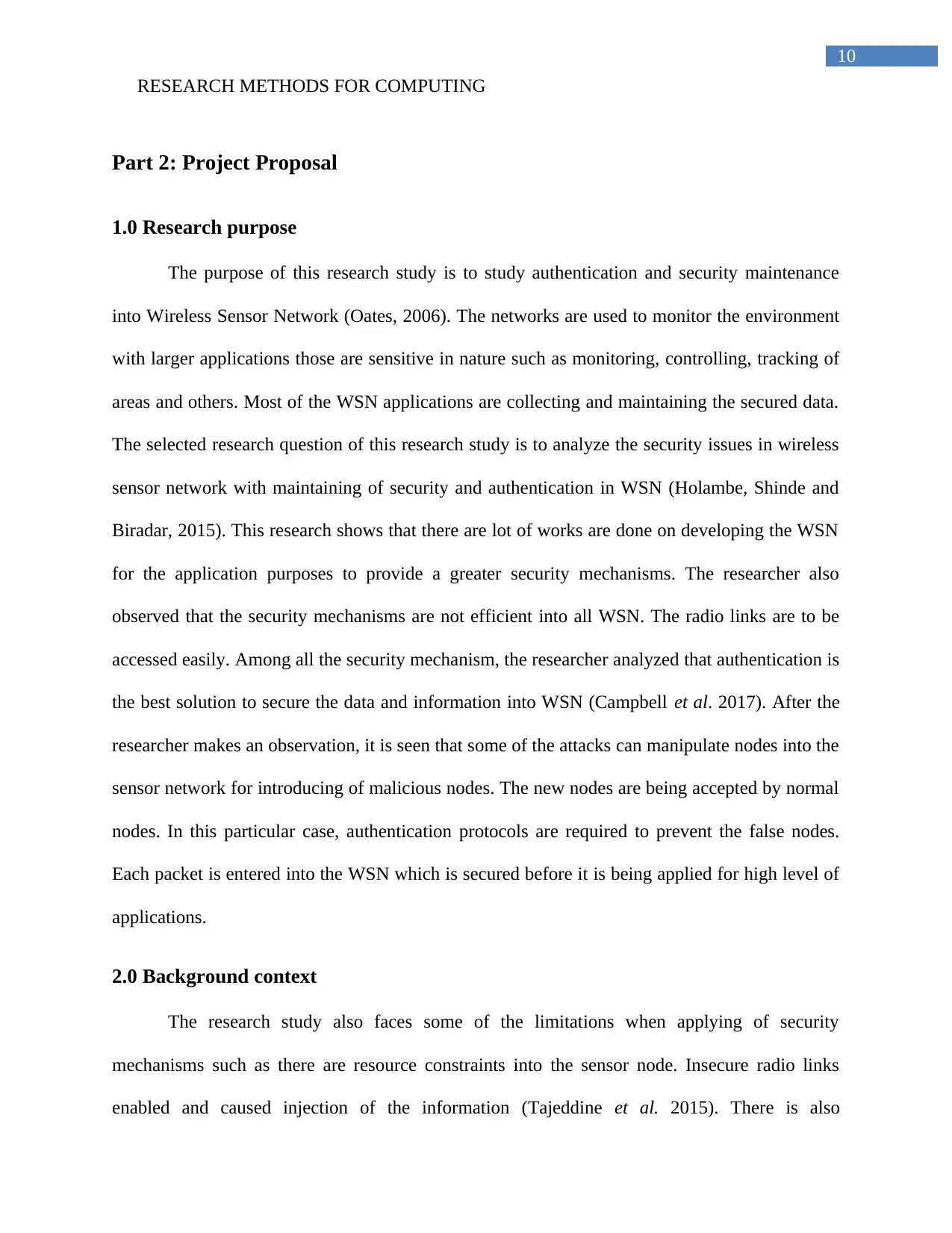
10
RESEARCH METHODS FOR COMPUTING
Part 2: Project Proposal
1.0 Research purpose
The purpose of this research study is to study authentication and security maintenance
into Wireless Sensor Network (Oates, 2006). The networks are used to monitor the environment
with larger applications those are sensitive in nature such as monitoring, controlling, tracking of
areas and others. Most of the WSN applications are collecting and maintaining the secured data.
The selected research question of this research study is to analyze the security issues in wireless
sensor network with maintaining of security and authentication in WSN (Holambe, Shinde and
Biradar, 2015). This research shows that there are lot of works are done on developing the WSN
for the application purposes to provide a greater security mechanisms. The researcher also
observed that the security mechanisms are not efficient into all WSN. The radio links are to be
accessed easily. Among all the security mechanism, the researcher analyzed that authentication is
the best solution to secure the data and information into WSN (Campbell et al. 2017). After the
researcher makes an observation, it is seen that some of the attacks can manipulate nodes into the
sensor network for introducing of malicious nodes. The new nodes are being accepted by normal
nodes. In this particular case, authentication protocols are required to prevent the false nodes.
Each packet is entered into the WSN which is secured before it is being applied for high level of
applications.
2.0 Background context
The research study also faces some of the limitations when applying of security
mechanisms such as there are resource constraints into the sensor node. Insecure radio links
enabled and caused injection of the information (Tajeddine et al. 2015). There is also
RESEARCH METHODS FOR COMPUTING
Part 2: Project Proposal
1.0 Research purpose
The purpose of this research study is to study authentication and security maintenance
into Wireless Sensor Network (Oates, 2006). The networks are used to monitor the environment
with larger applications those are sensitive in nature such as monitoring, controlling, tracking of
areas and others. Most of the WSN applications are collecting and maintaining the secured data.
The selected research question of this research study is to analyze the security issues in wireless
sensor network with maintaining of security and authentication in WSN (Holambe, Shinde and
Biradar, 2015). This research shows that there are lot of works are done on developing the WSN
for the application purposes to provide a greater security mechanisms. The researcher also
observed that the security mechanisms are not efficient into all WSN. The radio links are to be
accessed easily. Among all the security mechanism, the researcher analyzed that authentication is
the best solution to secure the data and information into WSN (Campbell et al. 2017). After the
researcher makes an observation, it is seen that some of the attacks can manipulate nodes into the
sensor network for introducing of malicious nodes. The new nodes are being accepted by normal
nodes. In this particular case, authentication protocols are required to prevent the false nodes.
Each packet is entered into the WSN which is secured before it is being applied for high level of
applications.
2.0 Background context
The research study also faces some of the limitations when applying of security
mechanisms such as there are resource constraints into the sensor node. Insecure radio links
enabled and caused injection of the information (Tajeddine et al. 2015). There is also
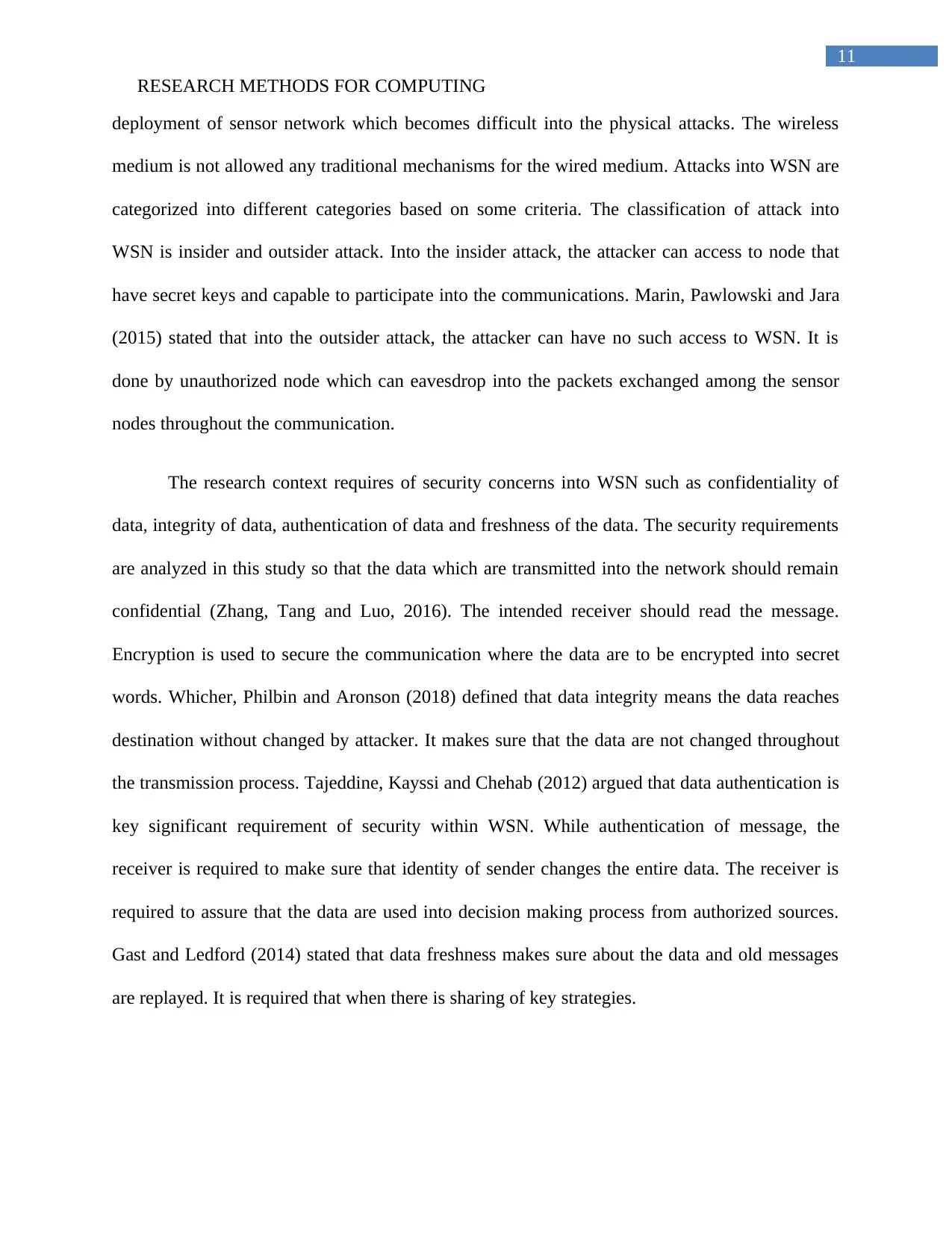
11
RESEARCH METHODS FOR COMPUTING
deployment of sensor network which becomes difficult into the physical attacks. The wireless
medium is not allowed any traditional mechanisms for the wired medium. Attacks into WSN are
categorized into different categories based on some criteria. The classification of attack into
WSN is insider and outsider attack. Into the insider attack, the attacker can access to node that
have secret keys and capable to participate into the communications. Marin, Pawlowski and Jara
(2015) stated that into the outsider attack, the attacker can have no such access to WSN. It is
done by unauthorized node which can eavesdrop into the packets exchanged among the sensor
nodes throughout the communication.
The research context requires of security concerns into WSN such as confidentiality of
data, integrity of data, authentication of data and freshness of the data. The security requirements
are analyzed in this study so that the data which are transmitted into the network should remain
confidential (Zhang, Tang and Luo, 2016). The intended receiver should read the message.
Encryption is used to secure the communication where the data are to be encrypted into secret
words. Whicher, Philbin and Aronson (2018) defined that data integrity means the data reaches
destination without changed by attacker. It makes sure that the data are not changed throughout
the transmission process. Tajeddine, Kayssi and Chehab (2012) argued that data authentication is
key significant requirement of security within WSN. While authentication of message, the
receiver is required to make sure that identity of sender changes the entire data. The receiver is
required to assure that the data are used into decision making process from authorized sources.
Gast and Ledford (2014) stated that data freshness makes sure about the data and old messages
are replayed. It is required that when there is sharing of key strategies.
RESEARCH METHODS FOR COMPUTING
deployment of sensor network which becomes difficult into the physical attacks. The wireless
medium is not allowed any traditional mechanisms for the wired medium. Attacks into WSN are
categorized into different categories based on some criteria. The classification of attack into
WSN is insider and outsider attack. Into the insider attack, the attacker can access to node that
have secret keys and capable to participate into the communications. Marin, Pawlowski and Jara
(2015) stated that into the outsider attack, the attacker can have no such access to WSN. It is
done by unauthorized node which can eavesdrop into the packets exchanged among the sensor
nodes throughout the communication.
The research context requires of security concerns into WSN such as confidentiality of
data, integrity of data, authentication of data and freshness of the data. The security requirements
are analyzed in this study so that the data which are transmitted into the network should remain
confidential (Zhang, Tang and Luo, 2016). The intended receiver should read the message.
Encryption is used to secure the communication where the data are to be encrypted into secret
words. Whicher, Philbin and Aronson (2018) defined that data integrity means the data reaches
destination without changed by attacker. It makes sure that the data are not changed throughout
the transmission process. Tajeddine, Kayssi and Chehab (2012) argued that data authentication is
key significant requirement of security within WSN. While authentication of message, the
receiver is required to make sure that identity of sender changes the entire data. The receiver is
required to assure that the data are used into decision making process from authorized sources.
Gast and Ledford (2014) stated that data freshness makes sure about the data and old messages
are replayed. It is required that when there is sharing of key strategies.
⊘ This is a preview!⊘
Do you want full access?
Subscribe today to unlock all pages.

Trusted by 1+ million students worldwide
1 out of 26
Related Documents
Your All-in-One AI-Powered Toolkit for Academic Success.
+13062052269
info@desklib.com
Available 24*7 on WhatsApp / Email
![[object Object]](/_next/static/media/star-bottom.7253800d.svg)
Unlock your academic potential
Copyright © 2020–2026 A2Z Services. All Rights Reserved. Developed and managed by ZUCOL.





